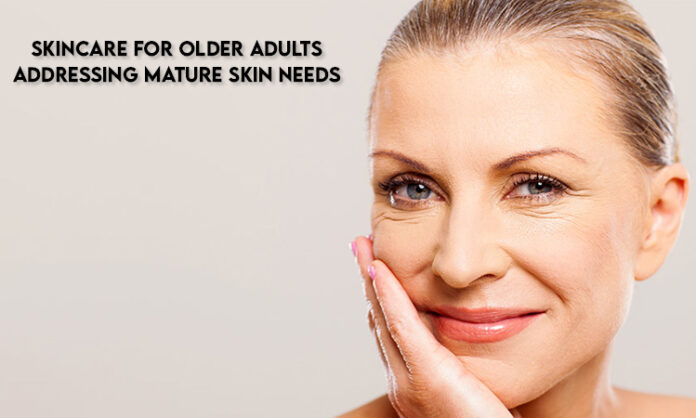As we age, our skin goes through a natural transformation—thinner texture, fine lines, dryness, and loss of elasticity become more noticeable. While these changes are a normal part of life, understanding how to care for mature skin can make all the difference in how it looks and feels.
This guide to skincare for older adults dives deep into the specific needs of aging skin, offering practical, dermatologist-approved tips to help you maintain a healthy, radiant complexion—at every age.
Why Does Mature Skin Need Special Care?
Aging affects your skin at every layer. Here’s what typically happens over time:
- Reduced collagen and elastin production, leading to wrinkles and sagging
- Thinner skin barrier, making it more prone to dryness and irritation
- Decreased oil production, resulting in rough or flaky skin
- Slower skin cell turnover, which causes dullness and uneven texture
- Increased sensitivity to sun and environmental damage
Because of these changes, skincare for older adults must focus on nourishment, protection, and support for the skin’s natural renewal processes.
Daily Skincare Routine for Mature Skin
A consistent routine built around hydration, gentle cleansing, and active ingredients can rejuvenate mature skin. Here’s a step-by-step routine to consider:
- Gentle Cleanser
Aging skin tends to be more fragile, so a mild, non-foaming cleanser is essential. Choose formulas free of sulfates, alcohol, and artificial fragrance. Look for:
- Cream cleansers
- Micellar water (if you wear minimal makeup)
- Hydrating ingredients like glycerin or aloe vera
Cleansing should be done once or twice a day to prevent dryness.
- Hydrating Toner or Essence
Toners aren’t just for younger skin. For older adults, a hydrating toner or essence can prep the skin for better absorption of serums and moisturizers. Look for ingredients like:
- Hyaluronic acid
- Rose water
- Green tea
- Panthenol
Avoid astringent toners with alcohol.
- Targeted Serum
Serums are power-packed with active ingredients that penetrate deeper into the skin. The best options for mature skin include:
- Vitamin C – Brightens dull skin and protects against sun damage
- Retinol (or Bakuchiol) – Boosts collagen and smooths fine lines
- Peptides – Help improve elasticity and skin firmness
- Niacinamide – Strengthens the skin barrier and reduces discoloration
Introduce one serum at a time and apply it at night unless otherwise directed.
- Rich Moisturizer
Older skin craves moisture. A nourishing moisturizer with emollients and occlusives will seal hydration and soften the skin. Key ingredients to look for:
- Ceramides
- Squalane
- Shea butter
- Jojoba oil
- Fatty acids
Use a separate eye cream if you’re targeting puffiness or crow’s feet.
- Daily Sunscreen
UV exposure is a top contributor to premature aging. Even in your 60s, 70s, or beyond, daily sun protection matters. Choose a broad-spectrum SPF 30 or higher with:
- Zinc oxide or titanium dioxide (gentle on mature skin)
- Hydrating base for dry skin types
- No added fragrance or alcohol
Apply every morning and reapply if outdoors.
Skincare Concerns Common in Older Adults (And How to Address Them)
Mature skin comes with its own set of challenges. Here’s how to handle the most common concerns:
- Fine Lines and Wrinkles
These are natural signs of aging, but their appearance can be softened.
Solutions:
- Use retinoids or retinol (start slowly to avoid irritation)
- Apply moisturizers with peptides or hyaluronic acid
- Consider facial massages or gua sha to stimulate circulation
- Dryness and Flaking
Dry skin is one of the earliest signs of mature skin.
Solutions:
- Choose oil-based cleansers and moisturizers
- Add hydrating masks or overnight sleeping creams
- Use humidifiers indoors, especially in winter
- Age Spots and Uneven Tone
Hyperpigmentation often appears due to years of sun exposure.
Solutions:
- Use vitamin C serums
- Apply niacinamide creams
- Consult a dermatologist for laser or chemical peel options
- Sagging Skin
Loss of elasticity leads to jowls, drooping eyelids, and less defined contours.
Solutions:
- Apply firming serums with collagen-boosting peptides
- Stay consistent with facial exercises
- Consider non-invasive treatments like RF or ultrasound therapy
Best Skincare Ingredients for Mature Skin
As your skin matures, ingredient selection becomes more critical. Here’s a cheat sheet of top-performing skincare ingredients for older adults:
| Ingredient | Benefit |
| Retinol | Boosts cell turnover and reduces wrinkles |
| Hyaluronic Acid | Deep hydration and plumper skin |
| Vitamin C | Brightens and fades age spots |
| Peptides | Supports collagen and elasticity |
| Niacinamide | Calms redness, evens tone |
| Ceramides | Repairs the skin barrier |
| Squalane | Moisturizes and soothes |
Avoid harsh exfoliants, alcohol-based products, and anything that strips moisture from the skin.
Skincare Tips for Older Adults: Lifestyle and Beyond
Skincare isn’t just about what you put on your face—it’s a whole-body, inside-out process. Here are some tips to maintain youthful skin naturally:
- Stay hydrated – Drink enough water daily
- Eat skin-friendly foods – Think colorful fruits, leafy greens, omega-3s
- Get quality sleep – Your skin repairs itself while you rest
- Move your body – Physical activity improves circulation and skin health
- Avoid smoking – It speeds up collagen breakdown and dulls the skin
- Limit alcohol – It dehydrates and inflames the skin
How to Adapt Your Skincare Routine With Age
As you move through different stages of aging, your skincare routine should evolve too.
- In your 50s: Focus on hydration, collagen support, and gentle exfoliation
- In your 60s and beyond: Prioritize rich creams, barrier repair, and simplicity—fewer but high-quality products
- Sensitive skin with age: Go fragrance-free and hypoallergenic
If you wear makeup, opt for creamy textures over powders to prevent product settling into fine lines.
